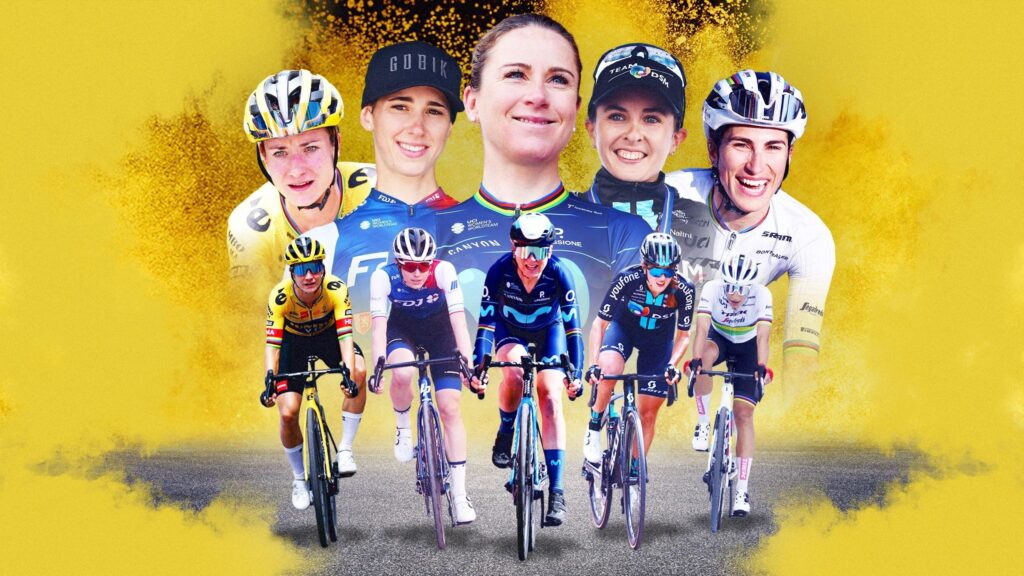Breaking the Taboo: Tour de France Femmes Riders Highlight Issues of Low Rider Weight and Disrupted Menstrual Cycles
As the inaugural Tour de France Femmes pedals into the spotlight, a critical conversation is emerging beyond the race’s exhilarating competition and breathtaking scenery. Female cyclists are breaking longstanding taboos by openly discussing the pressures they face regarding body weight and the often-overlooked impact of strenuous training and competition on their menstrual health. In an environment traditionally dominated by male athletes, the women competing in this prestigious event are using their platform to shed light on the significant physical and psychological challenges they encounter. With mounting evidence linking low rider weight to serious health implications-including menstrual cycle disruptions-these athletes are calling for a cultural shift in the cycling community. As they navigate the fine line between performance and well-being, their candid revelations are set to spark necessary discussions about health, body image, and the future of women’s cycling.
Riders Demand Change as Low Weight Pressure and Menstrual Cycle Disruptions Come to Light
In the competitive world of cycling, particularly at high-stakes events like the Tour de France Femmes, riders are beginning to unearth the consequences of societal pressures surrounding body weight. Athletes have raised alarms about the intense scrutiny they face, often impacting their mental and physical well-being. The pursuit of a lower weight for speed has led to detrimental effects such as eating disorders and extreme fatigue. Many competitors are now speaking out about how this fixation on weight can overshadow the thrill of competition, causing them to sacrifice their health for marginal gains on the bike. Riders are advocating for a culture that values performance over appearance, emphasizing strength and capability instead of mere numbers on a scale.
Moreover, the aspect of menstrual cycle disruptions is becoming increasingly prominent as athletes share their experiences. Reports suggest that the stress associated with performance pressures can disrupt hormonal balances, leading to irregularities that pose serious health risks. As riders band together to break the taboo surrounding these issues, they are demanding systemic changes from governing bodies, including better education on nutrition and health, as well as mental health resources tailored specifically for female athletes. This shift is essential not only for their individual well-being but also for the future of women’s cycling, fostering an environment where athletes can thrive without compromising their health.
Nutrition and Wellness Strategies Proposed to Combat Athlete Health Issues
In light of the recent discussions among Tour de France Femmes riders, it’s imperative to explore effective nutrition and wellness strategies designed to address the prevalent health issues such as low rider weight and irregular menstrual cycles. Recognizing the psychological and physiological challenges, health experts recommend a comprehensive, individualized approach to athlete nutrition. This includes a focus on macro and micronutrient balance, emphasizing the consumption of whole foods rich in proteins, healthy fats, and carbohydrates, which are crucial for sustaining energy levels during intense training and competition periods. Riders are encouraged to prioritize hydration and recovery protocols to maintain optimal body function and hormonal balance.
Additionally, mental health plays a critical role in an athlete’s overall well-being. Workshops and counseling sessions that stress the importance of body positivity and nutritional education can equip athletes with the tools to combat societal pressures. Programs focusing on mindfulness practices such as yoga and meditation can aid in alleviating stress and enhancing focus on performance rather than weight. Collaborating with nutritionists and psychologists can lead to personalized wellness plans that not only assess physical health but also encourage emotional resiliency. The following table outlines key strategies and their potential benefits:
| Strategy | Potential Benefits |
|---|---|
| Balanced Meal Plans | Supports energy levels and recovery |
| Hydration Techniques | Improves overall performance and reduces fatigue |
| Mental Health Workshops | Boosts emotional resilience and positivity |
| Mindfulness Practices | Enhances focus and reduces performance anxiety |
Advocacy for Education and Support Systems to Address Cycling’s Silent Struggles
The recent discussions sparked by the Tour de France Femmes riders bring to the forefront essential topics that have long been shrouded in silence within the cycling community. The intersection of low rider weight and disrupted menstrual cycles not only affects performance but also the overall well-being of female athletes. Advocates are now calling for a comprehensive approach to address these issues, emphasizing the importance of education and support systems tailored specifically for women in cycling. By fostering an environment that encourages open conversations, stakeholders can work towards dismantling the stigma surrounding these health concerns, creating a culture where athletes feel safe to share their experiences.
To effectively address these silent struggles, advocacy efforts should focus on several key initiatives:
- Awareness Campaigns: Promote understanding of health issues associated with low body weight and hormonal disruptions.
- Nutritional Programs: Implement tailored nutritional support to help athletes maintain a healthy body weight while optimizing performance.
- Health Education Workshops: Offer workshops that educate athletes on menstrual health and its impact on athletic performance.
- Access to Medical Professionals: Ensure female cyclists have access to sports medicine experts specializing in women’s health.
| Issue | Proposed Solution |
|---|---|
| Low Rider Weight | Nutritional Programs |
| Disrupted Menstrual Cycles | Health Education Workshops |
| Lack of Awareness | Awareness Campaigns |
| Limited Medical Support | Access to Medical Professionals |
Wrapping Up
As the Tour de France Femmes concludes, the conversation sparked by its riders transcends the race itself, illuminating the often-overlooked issues of athlete health and well-being. By bravely sharing their experiences, these elite competitors are not only breaking the taboo surrounding weight and menstrual health but are also advocating for a more comprehensive understanding of women’s bodies in sports. The implications of their revelations resonate beyond the cycling community, urging coaches, teams, and medical professionals to reassess their approaches towards athlete support. As the sports world grapples with these critical discussions, it becomes clear that the path toward a healthier, more equitable future for female athletes is not just about competition-it’s about recognizing and addressing the unique challenges they face. With each pedal stroke, the riders of the Tour de France Femmes remind us that the race for equality in sports is still ongoing, and their voices are vital in championing this cause.











